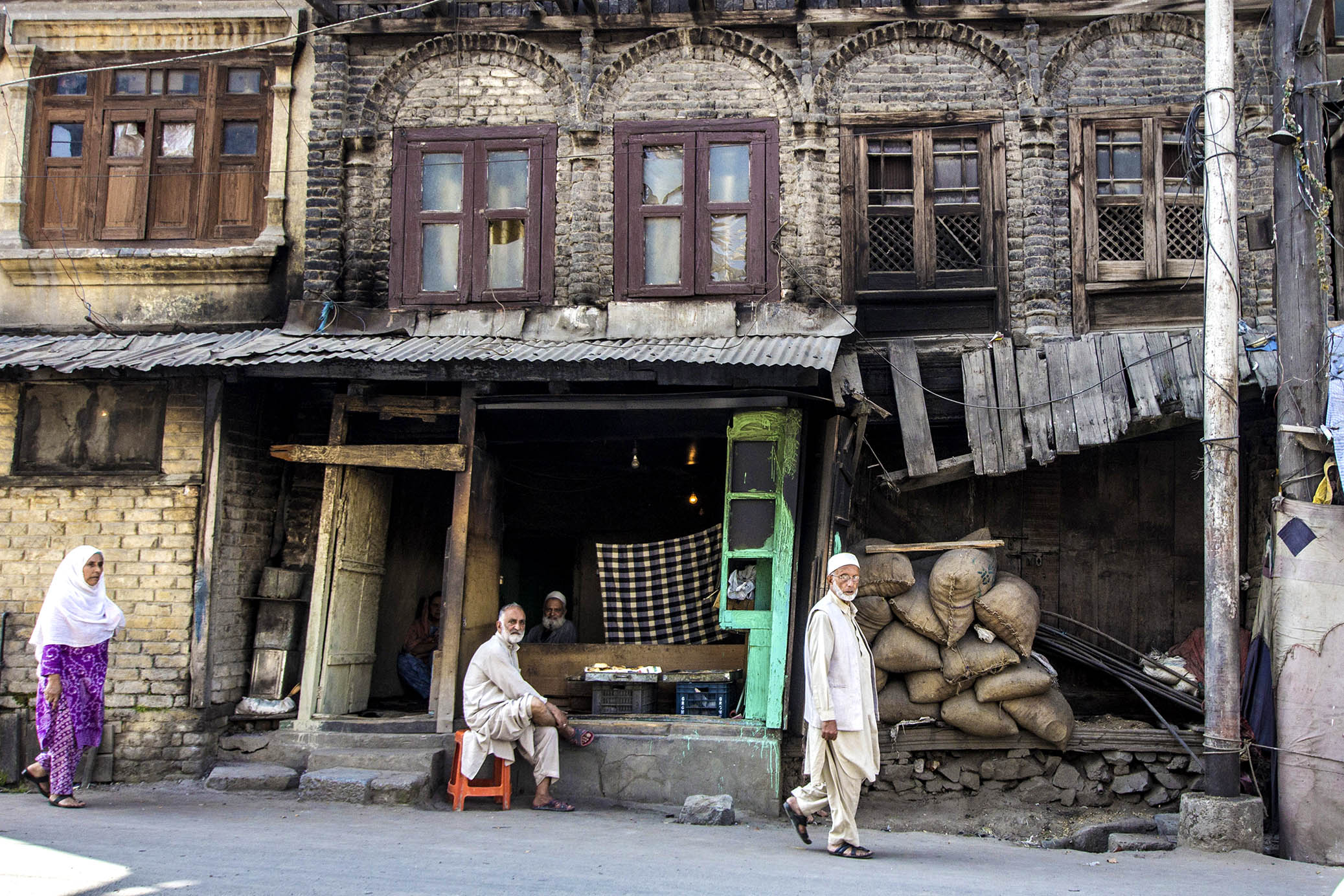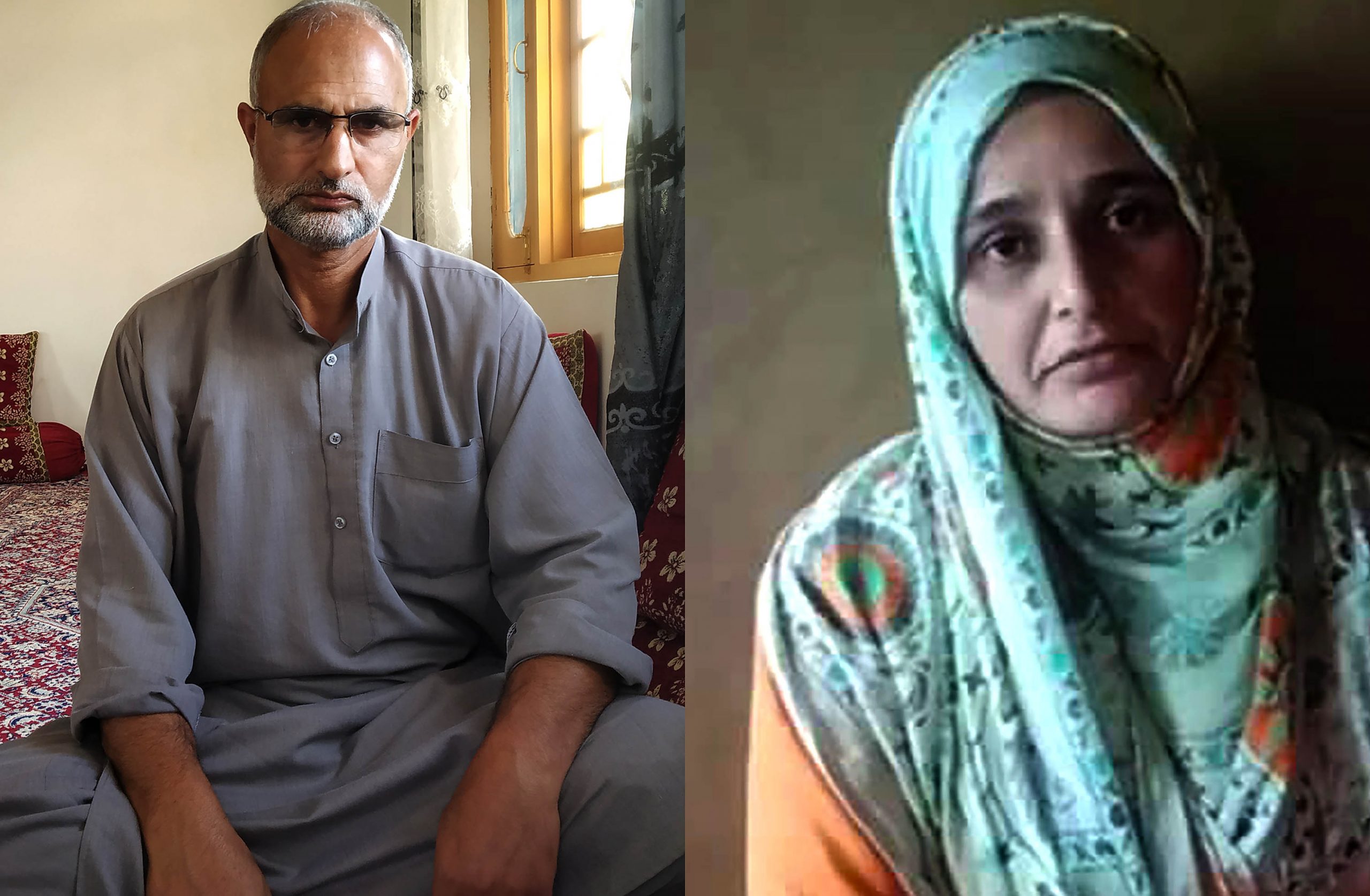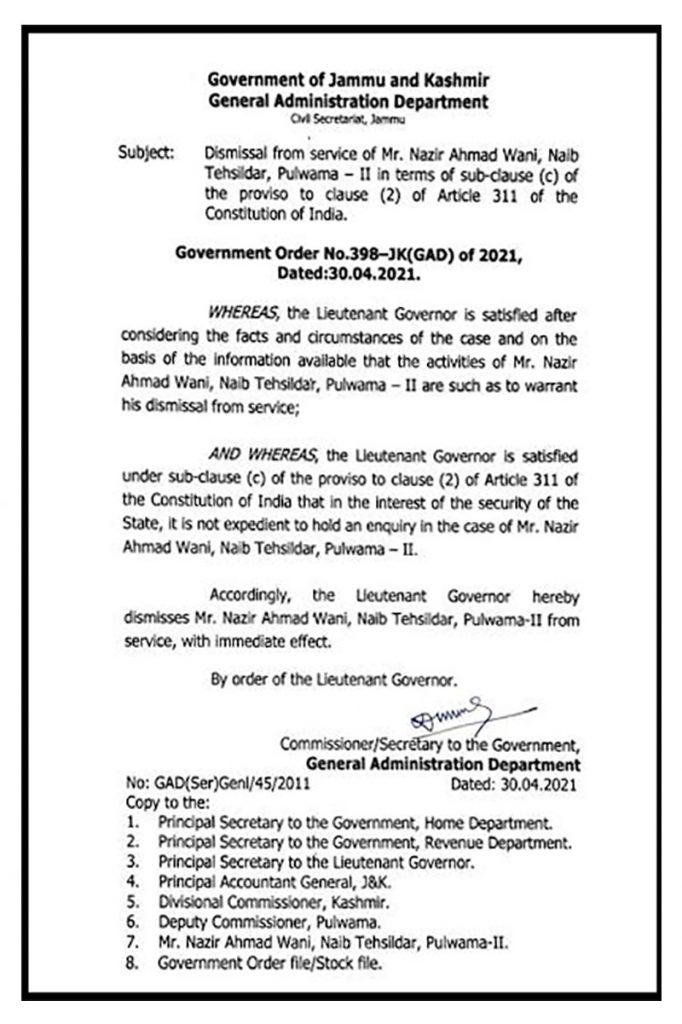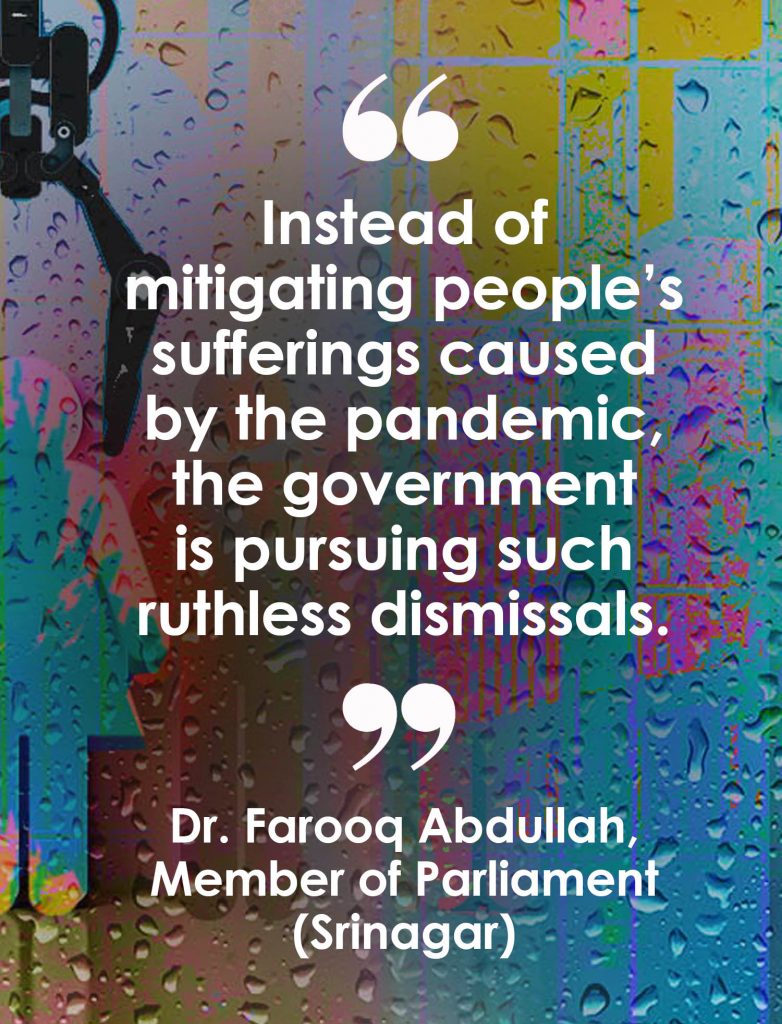Acareer in government usually means lifetime employment in most countries, but in Indian-administered Kashmir, several of those working for the state are being given their marching papers.
At least 18 employees as of mid-August from different government sectors – including the Jammu Kashmir Police, health, power, and education – have been dismissed so far for allegedly being involved in anti-national and terrorist activities. Media reports say that more will lose their jobs in the coming weeks.
The dismissed employees say that they have not been given any chance to defend themselves and counter the allegations leveled against them.
“Three months ago I was summoned by police and questioned for an hour,” recalls veteran teacher Nisar Ahmad Tantray. “They asked me a couple of questions and I gave them honest answers. I never knew I was being scrutinized, which would even lead to my dismissal from service.”

In the disputed Kashmir region, the enormous powers wielded by the administration mean a life of limbo for many people. Such powers include the dismissal of government employees without due process of law.
Last 10 July, the 55-year-old Tantray – fondly called ‘Master Ji’ in recognition of his decades of teaching – received a letter at his home in Anantnag district of South Kashmir. It read in part: “Whereas the Lieutenant Governor (LG) is satisfied after considering the facts and circumstances of the case and on the basis of the information available that the activities of Mr. Nisar Ahmad Tantray are such as to warrant his dismissal from service.”
The letter also said that the dismissal is “in the interest of the security of the state” and that “it is not expedient to hold an inquiry.”
The order was released by LG Manoj Sinha, who acts as a top administrator in Kashmir because the erstwhile state in August 2019 was bifurcated and downgraded into federal Union Territories (UT) now directly controlled by New Delhi.
Terrorist links?
Most of the dismissed employees including Tantray who were interviewed by ADC for this report say that they have been accused of having links with Jamaat-e-Islami (JeI), a politico-religious outfit banned by India in February 2019.
After JeI was banned, its leaders have been either jailed or subjected to constant raids. As recently as on 8 August, the raids were conducted at over 45 places on the houses and offices of JeI. The party, officials say, has been indulging in activities that are prejudicial to internal security and public order, and have the potential of disrupting the unity and integrity of the country.
In the late 1980s, when the armed rebellion broke out against Indian rule, Tantray’s older brother Abdul Ganie had picked up a gun. He later surrendered, but joined JeI as a member.
Tantray, meanwhile, was appointed as a teacher in 1985, on an ad hoc basis in replacement of Ganie. In 1989, Tantray was regularized. He taught at several schools in Kashmir; at the time of his surprise dismissal, he was teaching English at the government middle school, Hanji Mohallah.
Citing unnamed officials, the online publication Firstpost says that Tantray and another education colleague were fired because they were allegedly “‘actively’ involved in furthering the secessionist agenda unleashed by terror-sponsors from Pakistan and are Jamat-e-Islami ideologists.”
But Tantray, who has done Masters in English and Education, says simply, “I always taught my students with dedication. I have been punished for being a brother of a militant and JeI member.”

Veteran teacher Nisar Ahmad Tantray (left photo) received a letter last July dismissing him from government service as a teacher. The dismissal is “in the interest of the security of the state” and that “it is not expedient to hold an inquiry,” said the letter. (Photo by Aamir Ali Bhat) Razya Sultan (right), also a teacher, was accused in 2019 of having links with Jamaat-e-Islami (JeI), a politico-religious outfit banned by India in February 2019. She denies the charge. A few months ago she received a call informing her she had been dismissed from her job. (Photo by special arrangement)
Fellow teacher Rayza Sultan tells a similar story. In her case, it was her father, Mohammad Sultan Bhat, who was a member of JeI. A lawyer by profession, Bhat had also joined the 1987 elections as a candidate of the Muslim United Front (MUF). In 1996, he was kidnapped from his home by Ikhwan, a pro-Indian militia organization made up of surrendered militants; he was later found dead in a neighboring village.
Sultan was able to land a job in 2000, on compassionate grounds and after police and security verification. She would later enjoy promotions, and even reached the rank of head teacher.
Then in early 2019, Sultan was accused of having links with JeI – a charge she and her family still deny. She recounts, “I was summoned and questioned by police. I told them that I had no affiliation with any party.”
But just a few months ago, Sultan was walking back home from work when she received a call from Zonal Education Office and told that she had been dismissed. She also later received a termination order that had the same wording as that given to Tantray.
“I have been neither involved in any undesirable or unlawful activities nor have been served any type of explanation related to the security and law and order during my entire career,” says Sultan. “The charges against me are baseless.”

A termination letter issued to a public employee in the Indian-administered Kashmir. Almost every dismissed employee in the region has received a letter with the same wording. (Photo by special arrangement)
“My termination was premeditated and mala fide intent by some individual, group, or agency to victimize me for extraneous reasons,” she adds. She has requested the administration to provide her with the minimum details about her case and re-investigate to ascertain the facts.
A weaponized law
The identification and securitization of government employees suspected of activities against the “security of the State” began in April. That was when the administration in Kashmir constituted the Special Task Force (STF) under Article 311(2) (C) of the Constitution, which gives the state power to dismiss or remove or reduce in rank a government employee without any inquiry.
Alongside the Assistant Director-General of Police, who chairs the STF, the task force’s other members include the Inspector General of Police and representatives of the Home Department, Department of Law, Justice and Parliamentary Affairs, and other concerned government offices.
In collaboration with the Terror Monitoring Group set up by the Union Home Ministry in June 2019 to monitor terror activities and especially their funding in Kashmir, the STF refers its findings to a committee headed by the Chief Secretary, who has the final call on an employee’s dismissal.
“The process that leads to the termination of an employee is susceptible to misuse,” remarks Tantray. “I have been working as a teacher for more than 35 years and all of sudden I was accused of being involved in anti-national activities.”
In addition to going to court to challenge the government’s action, the dismissed state employees can approach the Central Administrative Tribunal. Charged with handling all the employee-related matters, the tribunal was constituted by the Central government in May 2020.
Leaders from both mainstream and separatist politics have condemned the termination of government employees in Kashmir. Member of Parliament from Srinagar Dr. Farooq Abdullah even describes the move in the midst of a pandemic “deplorable and callous,” and says that the formation of a task force to monitor employees is an assault on their rights. Secessionist leader Mirwaiz Umar Farooq, for his part, says it is inhuman and cruel to render people jobless. The government, he says, should revoke these orders and stop harassing and intimidating employees.
“Instead of mitigating people’s sufferings caused by the pandemic, the government is pursuing such ruthless dismissals,” says Farooq.
Former Jammu and Kashmir Chief Minister Mehbooba Mufti has also weighed in, saying that in the garb of pseudo-nationalism, the Indian government continues to disempower the people of Kashmir by trampling the Constitution that ought to be upheld.

Speaking to the national English daily The Hindu, another former Jammu and Kashmir Chief Minister, Omar Abdullah, said, “The termination of government employees without any due process is problematic. There has to be due process. Even under the law, you are innocent till proven guilty.”
LG Manoj Sinha insists, however, that action will be always taken against those who promote “secessionism” and “terrorism” in the Union Territory.
“My constitution gives me a right to take action against those supporting terrorism and separatism,” says Sinha. “I promise the people of Jammu and Kashmir as well as the people of the country that no action will be taken against innocents.”
If any person is suspected of activities against the state, Sinha says, it is only after the proper verification would action according to the Constitution be taken against such an individual.
Yet many of the dismissed employees seem to be bewildered why they have suddenly become jobless. Even the family of yet another public school teacher who was terminated from service is still in disbelief over what has happened to her.
“During her initial days as a teacher, she was going to school that was around 7 kms away from her home by foot to teach students,” says a relative, who requested anonymity for fear of reprisal. “Is this a reward she has got for her service? The charges leveled against her are completely unjustifiable.”●
Aamir Ali Bhat is a Kashmir-based independent journalist.



















